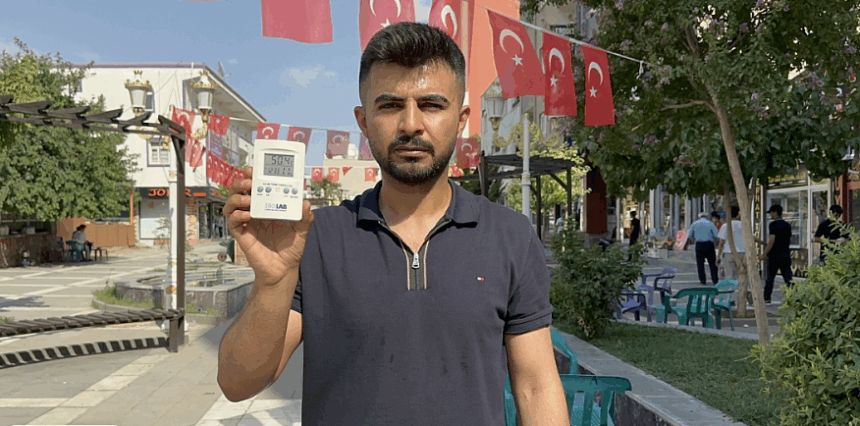Turkey has been engulfed in an unprecedented climate emergency, with the temperature hitting a historic high of 50.5°C (122.9°F) in Silopi, a southeastern town near the Syrian border, on July 25. This is the highest temperature ever recorded in the country, surpassing all previous extremes and signaling what experts warn is not just a heatwave but the new edge of human survivability.
“This is climate change, and it’s accelerating,” warned one widely-circulated weather bulletin. The statement described the heat levels as “the edge of human survival,” adding that even 30 minutes of exposure at these temperatures in dry conditions could lead to deadly heatstroke, with higher humidity reducing survival time even further.
A Nation on Fire
The soaring temperatures have compounded a series of devastating wildfires, particularly in the country’s western and Mediterranean regions, leaving at least 13 people dead and displacing thousands. President Recep Tayyip Erdoğan called the situation “a truly great disaster,” as the government declared Izmir and Bilecik “disaster zones affecting public life.”
While firefighters and government forces have been deployed nationwide, the frontline battle is increasingly being waged by ordinary citizens. Thousands of volunteers are using basic tools—hoses, buckets, even shovels—to hold the line against flames threatening homes, forests, and entire neighborhoods. In many areas, they were the first and only responders for hours.
The Turkish State Meteorological Service reported that temperatures exceeded 40°C in 31 provinces, with some regions seeing heat levels 6 to 12 degrees above seasonal norms—the kind of conditions that rapidly escalate the risk and spread of fire.
Training Turns Tragic in the Heat
The record-breaking heat has also turned deadly outside fire zones. During basic training exercises in Hatay, two young military conscripts died from dehydration, and several others were hospitalized after collapsing during outdoor drills. The tragedy raised serious questions about the lack of contingency planning for extreme weather in public institutions.
Antalya Under Siege
In Antalya, one of Turkey’s premier tourist destinations, wildfires reached dangerously close to residential neighborhoods. Flames and smoke were seen engulfing the sky above high-rise buildings, and several areas, including Aksu and Gazipaşa, were evacuated. Authorities reported that the fires were mostly under control, but some continued to grow, threatening homes and infrastructure.
The city registered 46.1°C, marking the highest temperature for July in Antalya since records began in 1930. As vacationers fled and bookings were canceled, the economic threat to Turkey’s vital tourism sector—a crucial source of foreign exchange—became alarmingly clear.
A Recurring National Crisis
These fires echo a disturbing pattern. In 2021, Turkey faced one of its worst wildfire seasons in modern history, with over 200,000 hectares of land burned across more than 30 provinces. Entire villages, forests, farms, and resorts were devastated.
That year, the Turkish government faced intense public backlash after admitting it lacked serviceable firefighting aircraft, forcing the country to rely heavily on foreign aid from Russia, Ukraine, and Azerbaijan. Authorities promised sweeping improvements, vowing to upgrade air fleets and modernize fire management systems.
Yet the current crisis suggests that many of the same logistical and operational failures remain. Local responders again report delays in aerial firefighting support, poor inter-agency coordination, and insufficient resources in the face of fast-moving infernos. Despite the government’s claims of expanded capacity—with 27 planes, 105 helicopters, and 6,000 vehicles now in service—the flames continue to outpace the response.
A Wake-Up Call
The Turkish government’s post-2021 pledges to overhaul its wildfire response capabilities now face a critical credibility test. While investments have been made, the scale and recurrence of these disasters reveal deep structural weaknesses in planning, early warning, logistics, and coordination—areas where progress appears uneven or stalled.
The events of this week have laid bare the climate vulnerabilities of Turkey, a country that has seen rising temperatures, longer droughts, and more frequent wildfires over the past decade. Scientists have long warned that the Mediterranean basin is a climate hotspot, warming faster than the global average. But the record-shattering events of July 2025 may have made the abstract terrifyingly real.
This week’s crisis is not just about weather—it is a national reckoning. From overstretched firefighting crews to preventable deaths in military units, from flaming cities to climate-battered coastlines, Turkey’s infrastructure, institutions, and economy are being tested in ways few could have imagined just a few years ago.
Unless systemic, science-based climate adaptation policies are urgently implemented—from urban design and emergency planning to military training and energy use—this summer could foreshadow a far more dangerous future.



